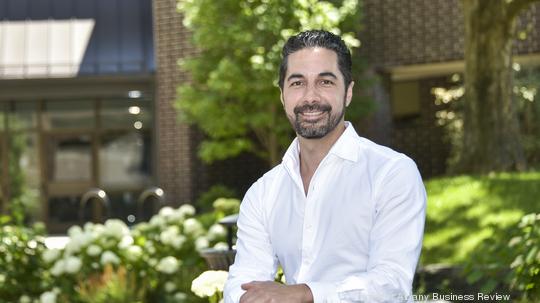
Sinclair Schuller took no time off in between his last company and his newest.
He and his co-founders incorporated Nuvalence in August 2018, the same month he sold the assets of the Troy-based Apprenda, and started working shortly after.
The only problem was they were unsure of exactly what to do next. They had offers from some venture capitalists, but they weren’t passionate about any specific product idea.
As they were mulling over ideas, they kept in mind a couple of trends they noticed during the 13-year life of Apprenda: the popularity of software platforms and the fact that all businesses needed to adopt some sort of tech.
They started reaching out to people in their networks to learn more about the consulting business, and they heard overall positive responses about experiences working on high-impact projects for a number of clients.
“That cinched it for us,” Schuller said.
They turned their focus toward building a contract-based firm that now designs platforms and products for mostly private companies, as well as some public organizations and a few startups. Apprenda, on the other hand, raised a total of $56 million to create a cloud-based platform product.
The co-founders of Nuvalence are Abraham Sultan, who was also a co-founder of Apprenda, and Rakesh Malhotra, a former executive for Apprenda.
“When we first started it, we didn't know that we were going to like it. Being in consulting is a totally different ballgame than building a product startup," Schuller said. "We ended up loving it, to the extent that we want to grow this continuously.”
Over the last three and a half years, Nuvalence has grown from six people – the three founders and three early employees – to 170 people. That's included 50 people hired in the first quarter of this year.
“We expect to probably grow another 50% in the next year,” he said.
“When we set up this company, we never set it up with specific targets in mind. We're still in that mindset. We manage how impactful our team is on our clients’ outcomes. And that is, I think, one of the best things we could have done.”
The company has about 55 people based on the second floor of the Troy Innovation Garage. Schuller is considering moving into a new office in the region, depending on how many people choose to work in the office regularly. There’s a cluster of people in Toronto near the physical office that opened there recently, as well as employees throughout Canada. And the company recently started employing people in Colombia, South America.
The first client for Nuvalence was a software CEO who needed help transitioning products to the cloud. From there, the founders met with other potential clients. They secured their second client about two months later. The third, a large publicly traded company, was about six to nine months after that.
“So it snowballed, in a positive way, out of control,” Schuller said.
He declined to disclose total revenue for Nuvalence, but he said it tripled between 2019 and 2020 and then again in 2021. They expect to double revenue year over year by the end of 2022.
“It's been profitable since day one,” Schuller said.
The firm has worked on platforms for renewable energy, self-driving cars and the government, including a Covid testing platform. The only partnership that’s been shared publicly is the Excluded Workers Fund product for the New York State Department of Labor.
Nuvalence primarily works with large, established companies – such as those in auto, pharma, or financial services – that are working to make a modern technological shift. Everything has been done from scratch using platforms like Amazon Web Services, Google Cloud and Azure, though the firm Is starting to build some open source components for reuse.
“They're just starting to catch on to the trend that the core strategy that they need to focus on is building software that differentiates them,” Schuller said. “We tend to focus on large organizations, where their aspirations and their current state are wide apart. Their current state might be a history of 100 years of doing business a specific way. And now they need to pivot into software massively, because they're going through an era shift.”
He says there is not much competition because there are very few consulting companies that focus specifically on digital platform development – especially with a team made up of software engineers experienced in bringing commercial products to market.
"That distinction is massively important in how successful a consulting organization can be today,” he said.
“There are probably companies out there that do the same. There's just more work than any one company can handle to begin with. So we're never put in a competitive posture, or rarely. We could take double the work in the next year if we have the people, the time and everything.”



